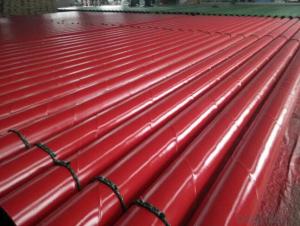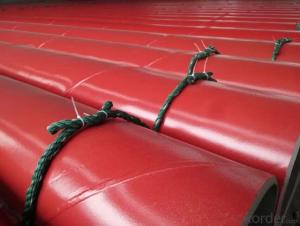ERW 3PE steel pipe external coating
- Loading Port:
- China Main Port
- Payment Terms:
- TT or LC
- Min Order Qty:
- 100m.t. m.t.
- Supply Capability:
- 40000m.t. m.t./month
OKorder Service Pledge
OKorder Financial Service
You Might Also Like
Specifications
water pipeline inner-layer tape
1 Butyl rubber as adhesive
2.SGS test report and DVGW certificate
3.corrosion protection
water pipeline inner-layer tape
State-of-the-Art Pipeline Protection for All Climates & Environments
System description:
WATER PIPELINE Inner -layer tape also be called pipe wrap anti-corrosion tape, polyethylene wrap tape.
water pipeline Inner-layer tapeT100 is engineered to assure a high bond to the primed pipe surface with excellent conformability characteristics, aggressive adhesive for corrosion protection and repair of main line coatings.
Inner-layer tapeT100 series is cold applied tape coating system for corrosion protection of Oil, Gas, Petrochemical, and Waste Waterburied pipeline, pipe can be buried, also can be underground ,overhead ,onshore and offshore .
Structure of water pipeline inner wrap tape
The specification of the tape consists of two layers, adhesive layer and film backing
Adhesive: butyl rubber
Film backing: Special blend of stabilized polyethylene
Features & Benefits
Provides a permanent bond to the primed steel pipes surface and provides protection against chemical electrolytic corrosion for underground pipelines.
long term corrosion protection
Worldwide reference lists. Established in-ground history
High chemical resistance under service temperature.
Outstanding electric property and permanent adhesion.
Cold applied, No release liner. Makes installation fast and easy.
Complies with EN-DIN 30672 and AWWAC-214 international standards and also ASTM standards.
Be used for water pipeline corrosion protection
System Properties
Type | T138 | T 150 | T165 | T180 | T 250 | T265 | T280 | |
Thickness | 15mil 0.38mm | 20mil 0.508mm | 25mil 0.635mm | 30mil 0.762mm | 20mil 0.508mm | 25mil 0.635mm | 30mil 0.762mm | |
Backing | 9mil 0.229mm | 9mil 0.241mm | 10mil 0.25mm | 10mil 0.25mm | 15mil 0.38mm | 20mil 0.508mm | 25mil 0635mm | |
Adhesive | 6mil 0.152mm | 11mil 0.279mm | 15mil 0.381mm | 20mil 0.508mm | 5mil 0.127mm | 5mil 0.127mm | 5mil 0.127mm | |
When used for ductile iron pipes inner layer 980-20 or 980-25 and outer layer 955-20 or 955-25 are recommended. | ||||||||
Elongation | ³300% | ³400% | ||||||
Tensile Strength | 55 N/cm | 70 N/cm | ||||||
Color | Black | White | ||||||
Peel Adhesion to Primed Pipe | 33 N/cm | |||||||
Dielectric Strength | 30 KV | |||||||
Dielectric Breakdown | 26 KV/mm | |||||||
Cathodic Disbandment | 0.24 in radius 6.4 mm | |||||||
Water Vapor Transmission Rate | < 0.1% | |||||||
Volume Resistivity | 2.5 x 1015 ohm.cm | |||||||
Impact resistance | 5.5Nm | |||||||
Penetration Resistance | <15% | |||||||
Performance | AWWA C-209,ASTM D 1000,EN 12068 | |||||||
Order information
Length | 100ft(30 M),200ft(60 M),400ft(120 M),800ft(240 M) |
Width | 2’’(50mm),4’’(100mm),6’’(150mm),17’(450mm),32’’(800mm) |
- Q:What is the difference between cast iron and steel pipes?
- Cast iron pipes and steel pipes are commonly used in plumbing and construction, but they have distinct differences. Let's explore these disparities. 1. Composition: Cast iron pipes consist mainly of an iron alloy, with small amounts of carbon and other elements. Conversely, steel pipes are primarily composed of iron, but they also contain varying amounts of carbon and other alloying elements like manganese, chromium, and nickel. 2. Strength: Steel pipes generally surpass cast iron pipes in strength due to their higher carbon content and alloying elements. This makes steel pipes more suitable for high-pressure applications or areas with heavy loads. 3. Flexibility: Compared to cast iron pipes, steel pipes offer more flexibility, making installation and adjustment easier. Cast iron pipes, being brittle, are less flexible and more prone to cracking or breaking under excessive stress or impact. 4. Corrosion resistance: Steel pipes are usually more prone to corrosion than cast iron pipes. However, this can be mitigated with various protective coatings or treatments applied to the steel pipes. Cast iron pipes, on the other hand, possess inherent corrosion resistance due to the formation of a protective layer of rust on their surface. 5. Noise insulation: Cast iron pipes excel in noise insulation due to their dense and heavy composition. This makes them ideal for reducing noise in residential plumbing systems. Steel pipes, being lighter and less dense, do not offer the same level of noise insulation. 6. Longevity: When properly maintained, cast iron pipes have a lifespan of over 100 years. Steel pipes, while still durable, may have a shorter lifespan depending on factors like the quality of the steel used, environmental conditions, and maintenance practices. In conclusion, the primary differences between cast iron and steel pipes lie in their composition, strength, flexibility, corrosion resistance, noise insulation, and longevity. The choice between the two depends on specific requirements, such as desired strength, durability, and noise reduction properties.
- Q:Can steel pipes be used for offshore oil and gas platforms?
- Yes, steel pipes are commonly used for offshore oil and gas platforms due to their high strength, durability, and resistance to corrosion in marine environments.
- Q:What is the role of steel pipes in the chemical manufacturing industry?
- Steel pipes play a crucial role in the chemical manufacturing industry as they are used for the transportation of various chemicals, both liquids and gases. The durability and resistance to corrosion of steel make it an ideal material for these pipes, ensuring the safe and efficient transfer of hazardous substances. Additionally, steel pipes are able to withstand high pressure and temperature conditions, allowing for the smooth operation of chemical processes.
- Q:What are the advantages of using steel pipes in marine applications?
- There are several advantages of using steel pipes in marine applications. Firstly, steel pipes are highly resistant to corrosion, making them suitable for prolonged exposure to saltwater and other harsh marine environments. Secondly, steel pipes have high strength and durability, allowing them to withstand extreme pressures and impacts commonly encountered in marine operations. Additionally, steel pipes have excellent thermal conductivity, making them ideal for transporting fluids at high temperatures. Lastly, steel pipes are readily available and can be easily fabricated and installed, ensuring efficiency and cost-effectiveness in marine applications.
- Q:How are steel pipes used in building foundations?
- Steel pipes are often used in building foundations as piles or piers. They are driven into the ground to provide structural support and stability for the building. The steel pipes act as load-bearing elements, transferring the weight of the structure to the underlying soil or rock. Additionally, they can also be utilized for underground utility installations or as part of a drainage system in building foundations.
- Q:ASME seamless tube how to express, what is the form, I did not find on the ASME, thank God!
- You can refer to the ASME B31.10, such as the requirements for the SA106GRB seamless steel tube outer diameter of 168.3 x 7.11, specifications can be marked as NPS6 SCH40 SMLS, the real mark should include pressure steel pipe factory name or trademark, and the material level, specifications, standards, wall number, batch number, pressure test (if any), NDE detection (if any)
- Q:What are the different methods of pipe joining for steel pipes?
- Steel pipes can be joined using various methods, each with its own benefits and drawbacks. These methods include: 1. Butt Welding: Two steel pipes are welded together by beveling or facing their ends to form a V-groove. Molten metal is then used to fill the groove, creating a strong and long-lasting joint. 2. Socket Welding: A socket is welded onto the end of a steel pipe, and another pipe is inserted into the socket and welded in place. This method creates a leak-proof and corrosion-resistant joint. 3. Threaded Joint: Steel pipes can be joined by threading the ends and using a threaded coupling or union to connect them. This method is commonly used for smaller pipes and allows for easy disassembly and reassembly. 4. Flanged Joint: For larger pipes, a flange is attached to the end of each pipe, and the flanges are fastened together with gaskets using bolts. This method is commonly used in industries such as oil and gas, water treatment, and chemical processing. 5. Grooved Joint: Grooving machines are used to create a groove on the outside of the pipe. A coupling or fitting is then inserted into the groove and secured with bolts or clamps. This method is quick to install and allows for easy disassembly and reassembly. The choice of pipe joining method depends on factors such as pipe size, application, and desired strength and durability. Each method has its own advantages and disadvantages.
- Q:What is the thermal conductivity of steel pipes?
- The thermal conductivity of steel pipes can vary depending on the specific type of steel used and its composition. However, on average, the thermal conductivity of steel pipes is around 50-60 watts per meter-kelvin (W/mK). This means that steel pipes are relatively good conductors of heat, allowing for efficient transfer of thermal energy. The high thermal conductivity of steel pipes makes them suitable for various applications, including heating systems, industrial processes, and infrastructure projects where heat transfer is essential.
- Q:What are the different types of steel pipe fittings?
- There are various types of steel pipe fittings, including elbows, tees, reducers, couplings, unions, plugs, caps, and flanges.
- Q:Are steel pipes suitable for use in automotive industries?
- Yes, steel pipes are suitable for use in automotive industries. Steel pipes offer high strength, durability, and resistance to corrosion, making them ideal for various applications in the automotive sector, such as exhaust systems, suspension systems, and fuel delivery systems. Steel pipes can withstand high temperatures and pressures, ensuring reliable performance and safety in automotive vehicles.
1. Manufacturer Overview |
|
|---|---|
| Location | |
| Year Established | |
| Annual Output Value | |
| Main Markets | |
| Company Certifications | |
2. Manufacturer Certificates |
|
|---|---|
| a) Certification Name | |
| Range | |
| Reference | |
| Validity Period | |
3. Manufacturer Capability |
|
|---|---|
| a)Trade Capacity | |
| Nearest Port | |
| Export Percentage | |
| No.of Employees in Trade Department | |
| Language Spoken: | |
| b)Factory Information | |
| Factory Size: | |
| No. of Production Lines | |
| Contract Manufacturing | |
| Product Price Range | |
Send your message to us
ERW 3PE steel pipe external coating
- Loading Port:
- China Main Port
- Payment Terms:
- TT or LC
- Min Order Qty:
- 100m.t. m.t.
- Supply Capability:
- 40000m.t. m.t./month
OKorder Service Pledge
OKorder Financial Service
Similar products
New products
Hot products
Related keywords






























